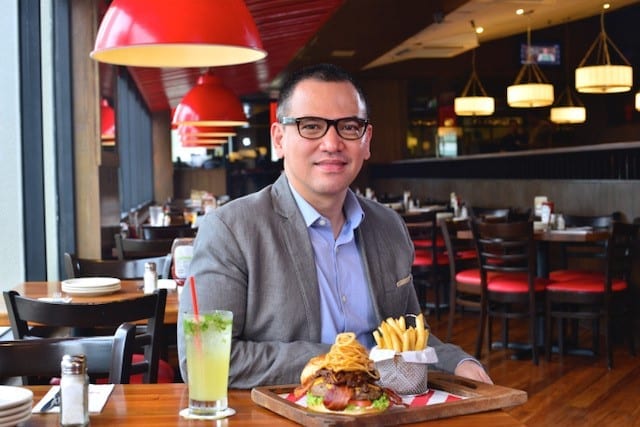
Bistro Group is the biggest international casual dining chain in the Philippines with 17 major restaurant brands like Italianni’s, TGIFridays, Fish & Co., and Watami, to cite a few. Bistro Group President Paul Manuud shares his insights on creating service memories.
Q1. What is the service philosophy of The Bistro Group? How is the philosophy reflected in the service policies and differentiation of The Bistro Group vs other restaurants?
A: We live by the philosophy of “Guaranteed Satisfaction”, which means guests’ experience should be flawless in all of our restaurants. If there’s anything that happens in a restaurant where we failed to guarantee the guests’ satisfaction, our people are empowered to make decisions on the ground. They don’t have to ask permission from their superiors to act immediately in making things right. We turn garbage into gold. We are not perfect. Most of us make mistakes once in a while but one thing we can guarantee our guests: we know how to correct our mistakes. So our philosophy is all about the overall experience that is impeccable.
What we want to achieve is always making sure our customers leave our restaurants happy. We don’t actually want to compare or differentiate Bistro with other restaurants because we always benchmark on ourselves. What we say or promise to do, we always deliver on the ground.
All playbook of service of the restaurant industry in the Philippines are one and the same; everything is all about excellence in service, customer satisfaction. What will set Bistro apart from others is that we execute what we promise to do. We walk the talk. We may not promise a lot of things to our guests but when we say so, we make it happen. We make sure our guests will experience the kind of warmth that when they dine in our restaurants, they feel the warmth and immediately recognize that they are in a Bistro restaurant. The guests, themselves, “feel” and “know” that they are in a Bistro restaurant.
Q2. Your employees are the face of The Bistro Group. How do you ensure they carry out their service mission well?
A: We believe that our people are the best assets of the company so we take care of all our employees and treat them as the most important persons in our organization. We place them above and before our guests because we always believe that if you take good care of your employees or team members, they will take care of you and the company. They will also take care of your guests. Our organization is very “soft“ with people but we are very “hard” on results. We value their opinion. We don’t short-change anyone and we make sure they are happy and content with what they receive financially. We reward them with incentives. And most importantly, we treat them as “owners” of this company. We also practice the “ownership theory” where our employees take care of our restaurants the way they would take care of their own business.
Q3. How are The Bistro Group’s employees chosen, screened, and trained? How do you know they have the real service attitude?
A: Our principle in handling people is: “We attract, we hire, we keep” the best people. Not necessarily the most intelligent but we are more attracted to emotional competence that one can equate with emotional intelligence.
From my experience, I work with the best people here, especially those who have grown with the company for so many years. They may not be the brightest or the most brilliant, but I’ve seen how good they are, how emotionally intelligent they are. We need heart for you to succeed in Bistro. We need passion and emotion. Our employees have high emotional intelligence and they have stayed and succeeded in the company.
In this company, no one gets hired without seeing me first—from janitors, food servers to the managers. Not that I have the last say about their chances for employment, but I really spend time and see them. I want to help their division head in assessing if their personalities and values are suitable for or blend with the values of the organization. Sometimes I don’t ask anything but listen to them and their stories. From there, I would somehow get to know them and get to feel whether this person belongs to Bistro.
Q4. What service management practices do you do in Bistro? Why do you do these?
A: The culture of excellence is uniquely Bistro. We strive to excel in everything we do. We are the best and worst critics of our products and concepts. Personally, I don’t ask or require any employee anything that I couldn’t do myself. That’s my basic management principle. If I ask them to take care of our guests, they would see me in our restaurants taking care of our guests. If I want them to go to work early, you won’t see me arrive late in the office. It’s more on “leading by example” or modeling the behavior. Most of our values and culture are defined by our actions. We have set of values that becomes where our center lies. When we stick to it, and personally stamp it, we own it. So everything that we do should be consistent with our values.
Q5. In terms of service culture, how do you get everyone on the same page about service that delights customers?
A: There is consistency in everything that we do. From me, my Vice presidents, Director for Operations — we all are consistent. I will go back to what I have mentioned that I do not ask my staff to do what I know I couldn’t do by myself. When I want our front-liners to take care of the guests, I make sure I know how to take care of the guests.
We roll up our sleeves to engage, work, and delight the customers. Our operations people do not have a permanent office. Our Operations team practices the “primetime culture”. During primetime—which is lunch and dinner—all our officers have to be “on the floor”, observing restaurant operations. Nobody eats when guests are eating. You will see our Directors and Vice presidents rolling up their sleeves, working with the restaurant staff. This takes us back to culture because this practice is in each and everyone of us since Day One. It’s developed over the years, heavily influenced by the owners then imbibed by the employees. So whatever culture you want to cultivate in the company, the owners and leaders should first lead by example and be consistent with the culture of the organization service, We are lucky to belong to a company that has a high regard for people, and values culture.

